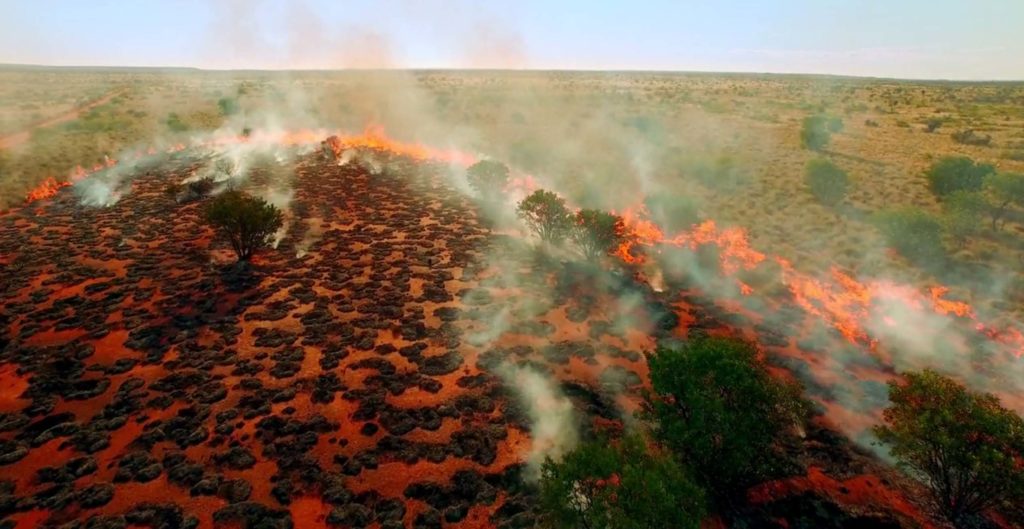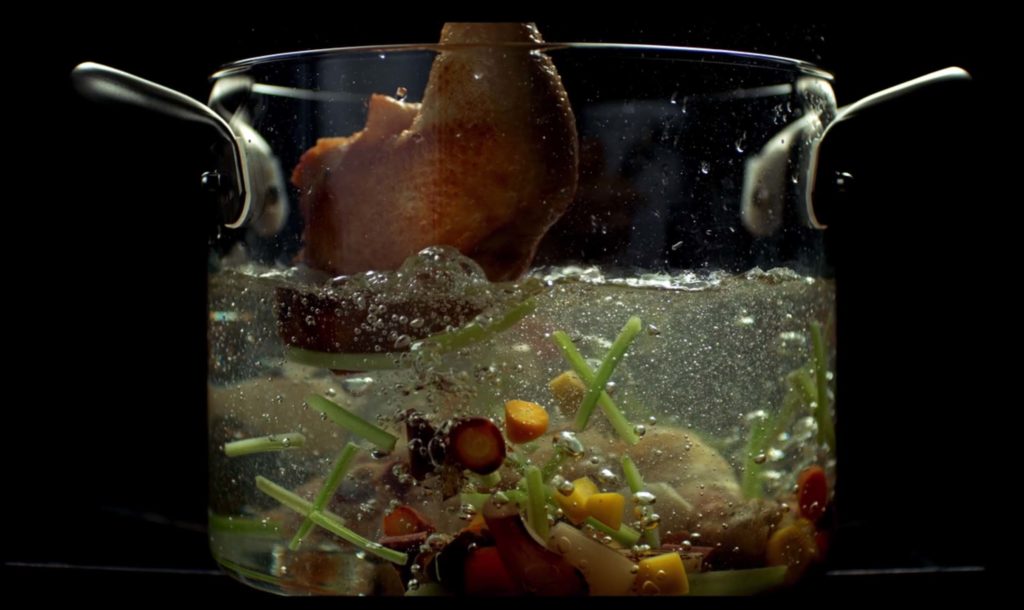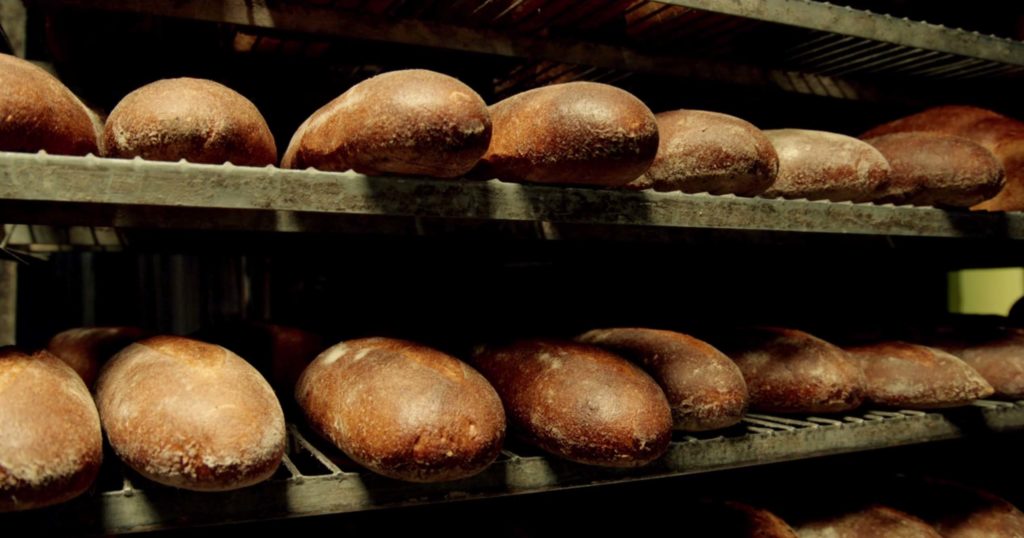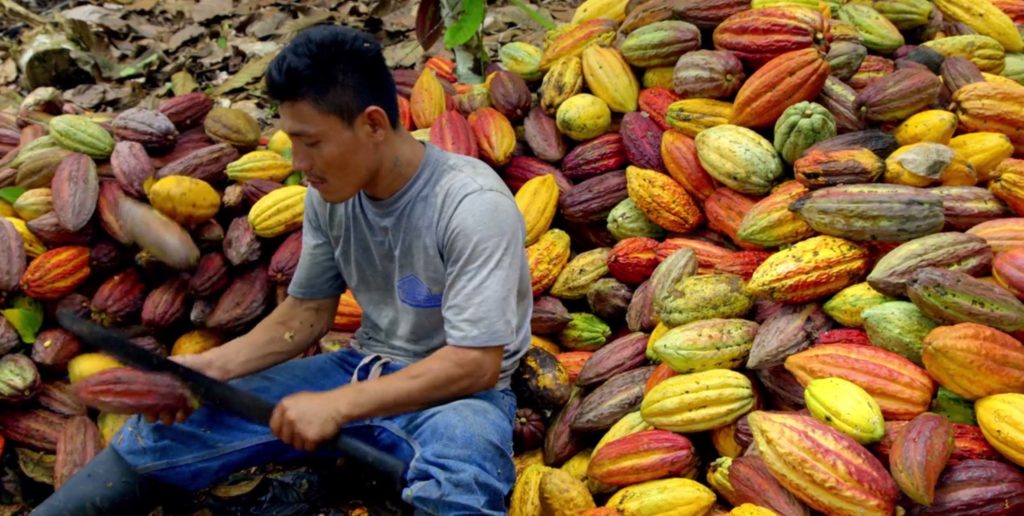Michael Pollan, author of many books, most famously The Omnivore’s Dilemma and most recently Cooked: A Natural History of Transformation, has transformed his most recent book into a four-episode documentary series, Cooked, based off of the four elements.
The first time I watched this series, I was blown away. Coming from someone who has binge-watched probably every food documentary on Netflix, this was the one that blew all the others out of the water. Pollan digs deep into the history of food culture, the cellular level of food science and the animalistic needs within humans to figure out why and how food has evolved to present day.
Fire

Photo courtesy of Netflix
“I started with fire because that’s where cooking begins.”
With this first episode comes, in my opinion, the single greatest observation anyone has made in the ape to human evolutionary field. Pollan partners with primatologists to explain why Homo erectus, the ape humans evolved from, came to distinguish itself from other primates.
It comes from the fact that humans are the only species that cooks. We are the only species that applies heat to a food we intend to consume for the sole purpose that it will transform that food into a meal that is easier for our bodies to physically digest.
Most primates spend about half of their waking hours chewing, literally chewing and chewing. The food that they eat is so fibrous that it requires manual labor in the act of chewing to break down the fibers into a more edible form. Pollan explains it is most likely that there was a forest fire and Homo erectus stumbled upon it and found that the dead burnt animals and plants were tastier and easier to eat.
Having discovered this newfound fire, it gave Homo erectus more time during the waking hours to learn, wander and evolve into the human it is today. This also gave Homo erectus the ability to grow a bigger brain and because a brain needs so much energy to function, giving them the ability to eat more and easier without having to waste all that energy into the physical labor of chewing.
Most people know it is the discovery of fire that allowed Homo erectus to evolve into the species it is today. However, it is the application of that fire that allowed exponential brain growth and created the human species of today.
Water

Photo courtesy of Netflix
“That’s what cooking with water means to me; to gather and to harmonize.”
The second episode in the series focuses on the tradition of one-pot cooking in India. Comparing the past and present of the American food industry to the ingenious community techniques of India, Pollan discovers the happiness and health factors that come along with both sides.
In the past 40 years, the average preparation time for food has been cut in half. In America in 1965, the average household would spend an hour preparing and cooking food, but today it has gone down to 27 minutes. It’s understandable if you think about how much busier people are now and how cheap mass-produced, pre-made food is.
However in Mumbai, they have community kitchens that address the need of wealth inequality, time management and community togetherness by performing one simple task: cooking. They had a problem within: many of the members in their community were not able to make or afford a proper home-cooked meal. In reaction to this, richer members of the community subsidize meals for the less wealthy in a community program they have.
Every member of the community comes ready everyday with their food cards and tiffins, multilevel metal bowls stacked upon each other, to carry the multiple parts of their meal. The food is homemade and dished out to every member of the community. Within this community they believe that “no one should feel pride in being rich, no one should feel shame in being poor.” They do not recognize class, they recognize equality.
This community very much mimics the act of a one-pot dish. If you draw a parallel of each member in the kitchen is an ingredient, alone they can only do so much, but collectively simmering together, they can create a flavor or union that is much greater than their original worth.
Air

Photo courtesy of Netflix
“You can not live without bread. Bread and water, they are the same.”
Next comes the Air episode, focusing on the relationship of bread in a community and even the relationship of yeast to gluten to life. Starting in Morocco, Pollan investigates the importance of bread within the society. In Morocco, the word for bread is also the word for life. It is illegal for you to take a knife to bread because that is too harsh and violent for such a sacred food.
Bread is one of simplest foods on the planet, a mixture of flour and water. On their own, these ingredients won’t do much for you. But together, they can fortify the life of a society. Bread is such an important food to so many societies that political leaders know that you can lose your head if the price of bread goes up too much.
In Tunisia, there were violent riots due to the almost doubling in price increase in bread causing some families to spend up to 80% of their income on bread for survival. The French Revolution started in relation to bread and during the Arab Spring, there was a shortage of wheat.
In response to the bread problems and the increasingly hostile ecosystem, scientists have been tasking a special look into this problem. Geneticists, farmers and people from all fields are observing the traits of different variations of grains and storing them in seed banks to make sure that one strand doesn’t die out or if there’s a shortage they are able to reverse the problem.
Whenever there is a problem with bread, there is political unrest.
Earth

Photo courtesy of Netflix
“Of all types of cooking, fermentation is the most miraculous and mysterious. One third of foods in our diet are fermented and we have no idea”
In the last episode, Pollan explains why he’s blown away by the act of fermentation because it’s cooking without any applied heat. It’s solely renovated by the bacteria and fungi. So many of the foods we consume have been fermented and we don’t even think about it: cheese, alcohol, ketchup, hot sauce, salami and even chocolate.
Pollan talks about the “beer before bread” hypothesis, explaining that there is substantial evidence that hunter-gatherers actually settled down in order to produce alcohol and not bread. The process of fermentation dates back thousands of years. In life before refrigerators, people had to ferment their food during the fall in order to be able to eat during the winter.
Surprisingly enough, we are not the only species to ferment. Think it’s cute when your dog buries its bone in the backyard? Well, they’re actually practicing a primordial instinct of burying meat before consumption. The act of burying the food in the earth, or in a cellar the room closest to the earth like many humans do, allows the complex ecosystem of bacteria, enzymes and yeast to break down the complex fibers and carbohydrates making the food easier to eat.
Since we had ways of preservation our food now, most of the fermentation that is done is done for taste. Many people dislike the smell and taste of fermented foods, like stinky cheeses, but the French actually have a saying for the smell of stinky cheese. They call it “les pieds de Dieu” or “the feet of God.”
Recently, human have created this unruly misconceptions demonizing bacteria, when in reality, majority of the bacteria is necessary for survival. Throughout human history of food, it shows that microbes are necessary to preserve the food via decomposition. This “cold cooking” of fermentation seems like magic but it is the magic that has kept the world alive for so long.




